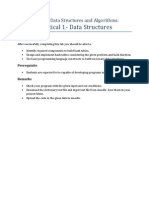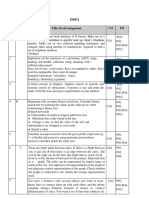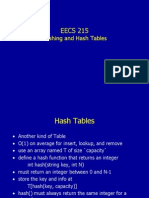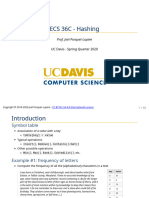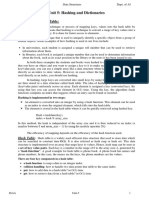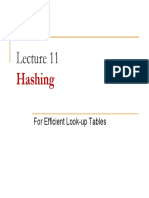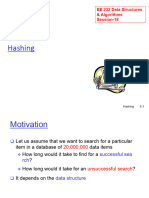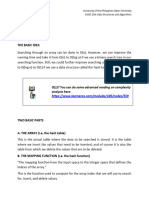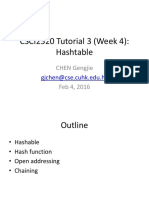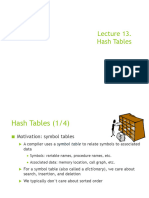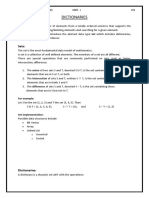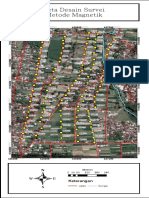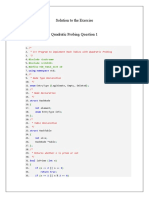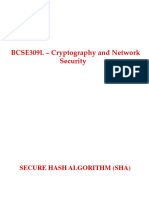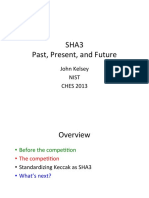Santa Monica College
CS 20A Summer 2015
Assignment #5
1. Comparing Hash Functions
A good hash function distributes keys uniformly across its output range. The simplest way to compare
hashing algorithms is to compare the number of collisions resulting when hashing a set of keys.
In part 1 of this assignment, you are given three well-known hash functions. You are also given a
dictionary with over 350,000 words.
For each hash function, compute the number of collisions occurring when calculating hash codes for
each word in the dictionary. Print out a list showing each colliding hash-key and the words that collided.
// http://www.cse.yorku.ca/~oz/hash.html
// First reported by Dan Berstein in the news group comp.lang.c.
unsigned long djb2(unsigned char *str)
{
unsigned long hash = 5381;
int c;
while (c = *str++)
hash = ((hash << 5) + hash) + c; /* hash * 33 + c */
return hash;
}
// Created for sdbm (a public-domain reimplementation of ndbm) database library.
// It was found to do well in scrambling bits causing better distribution of
// the keys and fewer splits.
unsigned long sdbm(unsigned char *str)
{
unsigned long hash = 0;
int c;
while (c = *str++)
hash = c + (hash << 6) + (hash << 16) - hash;
return hash;
}
// First appeared in K&R (1st edition). Terrible hashing algorithm because it
// produces many collisions.
unsigned long loselose(unsigned char *str)
{
unsigned long hash = 0;
int c;
while (c = *str++)
hash += c;
return hash;
}
Santa Monica College
CS 20A Summer 2015
Assignment #5
Here is some code that opens the dictionary, reads each word, calculates a hash key, and then closes a
dictionary. To calculate the total number of collisions, you must keep a running count of the number of
collisions for each hash key. After reading the entire dictionary, display the total collision count; then
display one row for each colliding hash key and the words that collided.
#include
#include
#include
#include
#include
#include
<iostream>
<stdlib.h>
<string>
<cstring>
<sstream>
<fstream>
// http://www.cse.yorku.ca/~oz/hash.html
using namespace std;
unsigned long djb2(unsigned char *str);
unsigned long sdbm(unsigned char *str);
unsigned long loselose(unsigned char *str);
int main()
{
const int MAX_CHARS_PER_LINE = 512;
ifstream fin;
char buf[MAX_CHARS_PER_LINE];
fin.open("dictionary.txt");
if (!fin.good())
{
cerr << "Error Opening File" << endl;
return 1;
}
while (!fin.eof())
{
fin.getline(buf, MAX_CHARS_PER_LINE);
unsigned long hkey = djb2((unsigned char *)buf);
string word = (char *)buf;
cout << word << " " << hkey << endl;
}
fin.close();
return 0;
}
Santa Monica College
CS 20A Summer 2015
Assignment #5
Sample output:
djb2 - Collisions = 59
5863248: bi d'
5863413: gi i'
5863611: mi o'
121541278: joyful synaphea
153103337: broadened kilohm
193486210: ais c's
193487299: bis d's
193488388: cis e's
193489477: dis f's
193492729: gid i'd
193492738: gim i'm
193492744: gis i's
193493833: his j's
193498189: lis n's
193499278: mis o's
193500367: nis p's
193502545: pis r's
193505812: sis u's
193506901: tis v's
193509079: vis x's
193510168: wis y's
193511257: xis z's
226706708: mensis menu's
253411110: arris art's
253986102: baris bat's
256495158: delis den's
256861062: doris dot's
266348430: loris lot's
267026877: manis map's
267031233: maris mat's
267168447: melis men's
268702848: nobis nod's
270582462: palis pan's
270869958: pilis pin's
271301202: pulis pun's
272953215: rakis ram's
272956482: ranis rap's
874715923: heliotropes neurospora
919705060: animate animate
1006249872: appling bedaggle
Santa Monica College
CS 20A Summer 2015
Assignment #5
2. Create and test your own hash function. Please be original. (5 points; prizes for the top three hash
functions.)
Your hash function must have the following signature:
unsigned long hf(unsigned char *str);
Test your hash function for collisions using the dictionary provided in part 1 of this assignment.






